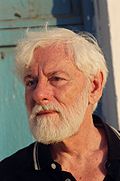Nowadays, emigrants are not cursed anymore -- something that would be hard to do, because many of them are the sons and daughters of the Israeli elite.
THERE WAS a time when it was the fashion in Israel, especially among historians, to draw analogies between Israel and the medieval Crusader kingdom.
Most people believe that the Crusader Kingdom of Jerusalem existed for about a hundred years and was destroyed by the great Saladin in the historic battle of the Horns of Hattin near Tiberias.
But that was not the case. The kingdom lived on for another hundred years, without Jerusalem, with its capital in Acre. It was not destroyed in battle -- but by emigration. There was a steady stream of crusaders -- even sons and daughters of the 6th or 7th generation -- who called it quits and "returned" to Europe, after despairing of the enterprise.
Of course, the differences between the two cases are immense -- different times, different situations, different causes. Yet for me, a dilettante student of the crusades, the similarities are significant. I am worried.
Among historians, there was a debate about a crucial question: Could the crusaders have made peace with the Muslims and become an integral part of the medieval Orient?
At least one prominent Crusader, Raymond of Tripoli, seems to have advocated such a course, but the very nature of the crusader state prevented it. After all, the crusaders had come to Palestine to fight the infidels (and take their land away). Except for some short armistices, they fought from the first to the last day.
The Zionists, until now, have followed the same path. We are engaged in a perpetual war. Some feeble efforts by some local Zionists, right at the beginning, to forge an alliance with the Arabs against the Ottoman Turks (who ruled the country at the time) were ignored by the Zionist leadership, and we are still fighting. (Just today, while reading the morning paper, I noticed again that some 70% of the news directly or indirectly concerns the Zionist-Arab conflict.)
True, from before the founding of Israel to this day, there have always been some voices (mine among them) advocating our integration in the region, but they have been ignored by all Israeli governments. The leaders always preferred a perpetual state of conflict, which allows Israel to expand without borders.
DOES THAT mean that we must despair of our state, as do those youngsters in Berlin?
My answer is: not at all. Nothing is foreordained. As I tried to tell our friends Unter den Linden, it all depends on us.
But first of all we must ask ourselves: What kind of solution do we want?
My friends and I won a historic victory when our concept -- Two States for (the) Two Peoples -- became a world consensus. But now some people have decreed that "the Two-state Solution is dead."
This always amazes me. Who is the doctor who has issued the death certificate? On what grounds? There are many different forms this solution can take, regarding settlements and borders, who has decided that they are all impossible?
No, the death certificate is a forgery. The two-state ideal is alive because it is the only viable solution there is.
THERE ARE two kinds of highly motivated political fighters: those who are looking for ideal solutions and those who will settle for realistic ones.
(Note: You can view every article as one long page if you sign up as an Advocate Member, or higher).





